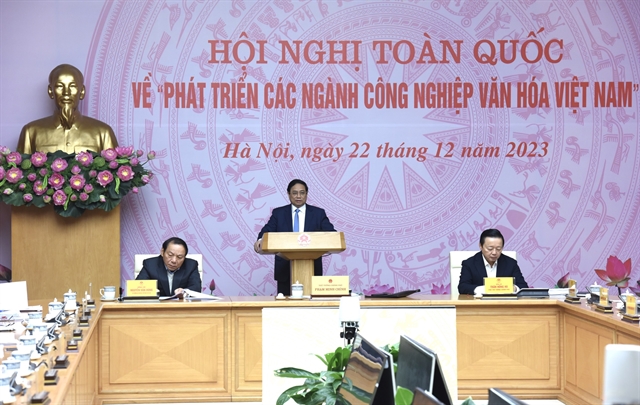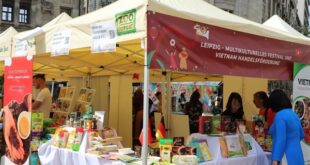HÀ NỘI Prime Minister Phạm Minh Chính yesterday emphasised the importance of the country’s cultural industry having a strategic mindset and proactive approach, contributing to socio-economic development.
He also called for the selection of top talent to drive the breakthrough development of Việt Nam’s cultural sector, ensuring it contributes more to national GDP.

|
| Prime Minister Phạm Minh Chính presides over the National Conference on the Development of Cultural Industries. VNA/VNS Photo Dương Giang. |
The PM was speaking at a national conference yesterday, alongside Deputy Prime Minister Trần Hồng Hà.
Leaders of seven ministries and 63 provinces and cities, along with experts, enterprises, and international units working in cultural industries, joined the National Conference on Development of Cultural Industries in both in-person and online.
The PM highlighted that the development of cultural industries is taking place strongly and gradually becoming an important driving force in promoting economic and social development.
“Việt Nam has great potential and advantages for developing the cultural industries,” he said.
At the conference, the PM urged all ministries, sectors, localities, organisations, and units to develop cultural industries, encouraging breakthroughs and respecting creative freedom.
The government leader underlined the importance of strong transformation from awareness to action, innovation in thinking and breakthroughs in working methods.
Ministries, sectors, and localities were assigned specific tasks in the work to proactively and decisively implement and deliver solutions, as well as build a set of policies to support cultural industries.
The cultural development strategy for 2030 has set the target that cultural industries will contribute 7 per cent of GDP.
Six cultural industries that need to be focused on are cinema, performing arts, cultural tourism, handicrafts, design, software, and games.
The PM added that cultural industries’ products and services must ensure they meet five factors, including creativity, identity, uniqueness, professionalism, and competitiveness, based on the Culture Outline, gradually creating brands for cultural products and services at the national level, and participating in the global cultural industries.

|
| National Conference on the Development of Cultural Industries. VNA/VNS Photo Dương Giang. |
At the conference, the delegates presented and discussed innovative approaches to the management and investment of the cultural industries, as well as the obstacles and problems they encountered and proposals to overcome and advance the growth of the cultural industries.
According to the Ministry of Culture, Sports, and Tourism (MoCST), cultural industries make a sustainable contribution to the country’s socio-economic development and Việt Nam’s image around the world.
In 2018–2022, the production value of Việt Nam’s cultural industries is estimated at VND1.059 quadrillion.
The average five-year growth rate in the number of economic establishments operating in cultural industries is estimated at 7.2 per cent per year.
“Việt Nam is a mid-range country in terms of cultural industries’ development. We still have much room for development,” said Minister of Culture, Sports and Tourism Nguyễn Văn Hùng.
“Enhancing the value of literary and artistic works in the digital environment in Việt Nam is necessary for writers and artists to engage in the field of cultural industry. Besides advantages, the digital environment has numerous challenges, such as copyright issues and dependence on technology,” said Đoàn Thanh Nô, vice chairman of the Việt Nam Union of Literature and Arts Associations.
From a business viewpoint, Ngô Thị Bích Hạnh, deputy general director of Bình Hạnh Đan Media JSC (BHD), shared her perspective on policies that the government can support Vietnamese enterprises to develop the film industry and digital content industry.
“Regarding policies to develop cultural industries, it is necessary to develop and enact laws on intellectual property for cultural products,” Hạnh said.
“Cultural products cannot be loaned without tangible assets. I also hope the government can support cultural enterprises to produce films.” VNS
- Reduce Hair Loss with PURA D’OR Gold Label Shampoo
- Castor Oil Has Made a “Huge” Difference With Hair and Brow Growth
- Excessive hair loss in men: Signs of illness that cannot be subjective
- Dịch Vụ SEO Website ở Los Angeles, CA: đưa trang web doanh nghiệp bạn lên top Google
- Nails Salon Sierra Madre
 VnExpress News The News Gateway of Vietnam
VnExpress News The News Gateway of Vietnam





